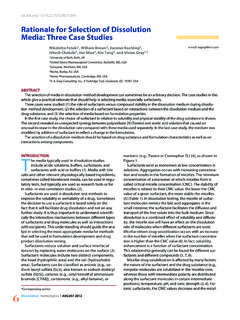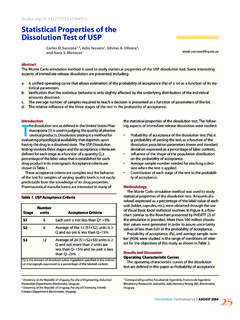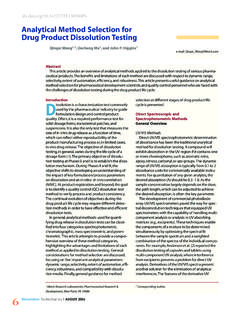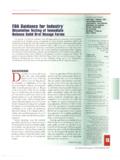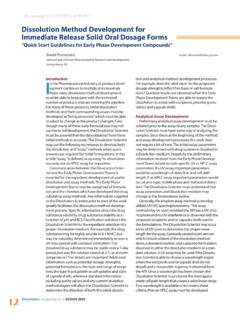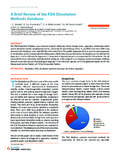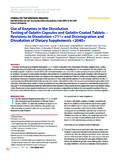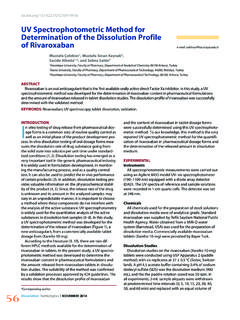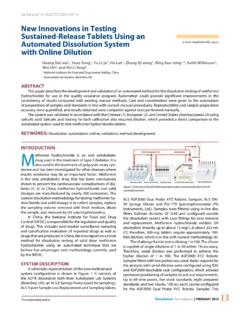Transcription of Approaches to the Investigation of Dissolution Testing ...
1 50 Dissolution Technologies | NOVEMBER 2013 Approaches to the Investigation of Dissolution Testing Changes and Failures: AAPS Webinar SummaryJianmei KochlingGenzyme, a Sanofi Company68 New York Avenue, Framingham, MAAn AAPS Webinar entitled Approaches to the Investigation of Dissolution Testing Changes and Failures was presented by Dr. jianmei kochling and moderated by Gregory Martin on May 23, 2013. This webinar was sponsored by the IVRDT Focus webinar presented a systematic approach by dis-secting individual variables that have the potential to affect Dissolution Testing . The presentation was delivered in two parts based on the investigational strategy. The first section was on understanding drug formulation while the second section focused on the Dissolution method. The major factors that affect Dissolution Testing due to formulation changes ( , drug load, particle size, tablet hardness, disintegration, excipient composition, gelatin capsule cross-linking, polymorph change on stability) were discussed with case study examples.
2 Dissolution method case studies illustrated coning and gelling, agita-tion speed, sinker selection, buffer composition and pH, deaeration, and surfactant amount and webinar offered theoretical principles of Dissolution Testing that support the explanations for practical problems. The presentation was followed by a Q&A session. Questions about how to set specifications for early development insoluble compounds, how to deaerate surfactant-containing media, and whether PEAK vessels can be used if USP vessels at 75 rpm give results similar to 50 rpm PEAK vessels were asked. The audience enjoyed this presentation, and most people commented that it was a very informative and comprehensive presentation on Dissolution test trouble-shooting. There were 347 attend-ees from 11 countries including the United States, Canada, Belgium, Germany, Great Britain, Greece, Italy, Netherlands, South Africa, and Sweden. The webinar was well delivered, and the team received numerous IVRDT Focus Group is affiliated with the AAPS APQ division.
3 This focus group consists of a number of volunteers from industry, academia, and government agencies. The group meets on a monthly basis to discuss current trends, is-sues, technologies, and hot topics in the Dissolution industry, as well as topics from AAPS annual meetings and other meet-ing programming. It has played an instrumental role in guid-ing the Dissolution society technically. Please join the IVDRT Focus Group and attend the business meeting at webinar in archived at the AAPS website AAPS members have free access to all AAPS webinars. Speaker jianmei kochling is a director of quality sci-ence and analytical technology of the biologics division at Genzyme Corporation, a Sanofi company. She is responsible for introducing and implementing new science and technol-ogy to the next generation analytical methods supporting Genzyme s commercial products, including methods for release and stability, protein characteriza-tion, impurity identification, metal Testing , and cleaning validation.
4 Prior to this posi-tion, Dr. kochling was a director of quality control technical services for biologics and a scientific associate director of analytical de-velopment for small molecules at Genzyme. Dr. kochling has 12 years of experience in leading analytical development supporting small molecule drug development from pre-IND to NDA. Dr. kochling is a steering committee member for both the AAPS APQ Dissolution and Stability Focus Groups. She also serves on the USP Expert Committee for Enzyme Use in Dissolution . jianmei kochling received her from Northeastern University, from Virginia Com-monwealth University, and from Fudan Greg Martin is President of Complectors Con-sulting ( ), which provides consulting and training in the area of pharmaceutical analytical chem-istry. He has particular interest in QbD/Lean Approaches to Dissolution Testing , impurity methods, method lifecycle (development/validation/transfer), and instrument quali-fication, and is passionate about using good science and sound logic to achieve high quality results, consistent with cGMPs, while minimizing resources.
5 Mr. Martin has over 25 years of experience in the pharmaceutical industry and was Director of Pharmaceutical Analytical Chem-istry (R&D) for a major PhRMA company for a number of years. In addition, he has vol-unteered for the USP for over 10 years and currently serves as Vice Chair of the General Chapters Physical Analysis Expert Commit-tee, and serves on Expert Panels on Valida-tion and Verification, Weights and Balances, Residual Solvents, and Use of Enzymes for Dissolution Test-ing of Gelatin Capsules. He is also Chair of the AAPS In Vitro Release and Dissolution Testing Focus Group. Mr. Martin is coauthor (with Vivian A. Gray) of the series Dissolution Concepts and Applications, which has appeared in Journal of Validation Technology and Journal of GXP Compliance. He can be contacted at e-mail.
